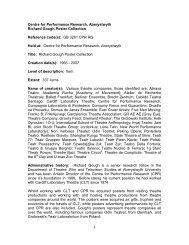IGES Newsletter Issue 2 - Aberystwyth University
IGES Newsletter Issue 2 - Aberystwyth University
IGES Newsletter Issue 2 - Aberystwyth University
Create successful ePaper yourself
Turn your PDF publications into a flip-book with our unique Google optimized e-Paper software.
OFF THE BOOKSHELF<br />
‘Fuel for Free’<br />
Wearing his trans-disciplinary hat, engineer<br />
and postgraduate political geographer<br />
Kelvin Mason (kjm04@aber.ac.uk) has<br />
written a practical guide for small-scale<br />
brick-makers and development field<br />
workers. The guide confronts prevalent<br />
ideas of both development and the<br />
environment. Fuel For Free presents an<br />
overview of the use of wastes as fuels and case studies from<br />
the experience of ITDG/Practical Action in Peru, Zimbabwe and Sudan.<br />
‘Benchmark paper<br />
in Hydrology’<br />
One of Professor Tony Jones’s (jaj@<br />
aber.ac.uk) early research papers,<br />
published in Water Resources Research,<br />
has been selected as a benchmark<br />
paper in hydrology by the International<br />
Association of Hydrological Sciences. The<br />
paper introduced soil piping to hydrological<br />
theory and proposed that flow through these subsurface<br />
pathways can make an important contribution to stormflow in rivers.<br />
Previous theory maintained that only water flowing over the surface was<br />
a significant source of flood flows in rivers.<br />
Subsequent field experiments have confirmed the hypothesis, with<br />
around 50% of discharge in part of the upper Rheidol catchment being<br />
supplied by soil pipes. The paper is one of just 31 selected papers<br />
published since the ground-breaking work of Robert Horton in 1933<br />
that initiated modern scientific hydrology.<br />
It is reprinted in the IAHS Benchmark Papers in Hydrology Series (2006)<br />
with a commentary by Professor Keith Beven of Lancaster <strong>University</strong>.<br />
‘Encyclopedia of<br />
Quaternary Science’<br />
November 2006 saw the publication of the stunning<br />
4-volume Encyclopedia of Quaternary Science, to<br />
which our own Dr Helen Roberts and Professor<br />
Ann Wintle were invited to contribute entries.<br />
Printed in colour, the encyclopedia is written by a<br />
team of leading experts in the field of Quaternary<br />
Science, and designed to be “an essential reference<br />
for scientists, students, and others” studying this important period of the<br />
last 1-2 million years of the Earth’s history. The articles are pitched at a<br />
level which makes the material accessible to undergraduate students,<br />
whilst also providing researchers with the most up-to-date information.<br />
Don’t just take our word for it though - check it out for yourself at the<br />
library (or visit http://www.books.elsevier.com/eqs).<br />
5<br />
‘The Nature of the State’<br />
Written by three members of human<br />
geography staff in <strong>IGES</strong> (Dr Mark<br />
Whitehead, Dr Rhys Jones and<br />
Professor Martin Jones), and<br />
published in the Oxford Geographical<br />
and Environmental Studies series<br />
(Oxford <strong>University</strong> Press), The<br />
Nature of the State challenges<br />
the ways in which geographers<br />
and social scientists approach<br />
the study of state-nature<br />
relations. The authors analyse<br />
different instances of statenature<br />
interaction from all over the world,<br />
considering the geo-politics of resource conflicts, the operation o f<br />
natural history museums, the organizational practices of<br />
environmental departments and ministries, the regulation of genetic<br />
science, and contemporary forms of state intervention within issues<br />
of climate change.<br />
‘Field Techniques in<br />
Glaciology and Glacial<br />
Geomorphology’<br />
All geography and earth science students<br />
carry out fieldwork as part of their studies,<br />
either on supervised field courses or<br />
independently as part of an extended<br />
project. Field Techniques in Glaciology<br />
and Glacial Geomorphology, by<br />
Professor Neil Glasser (nfg@aber.<br />
ac.uk) and Dr Bryn Hubbard (byh@<br />
aber.ac.uk) of <strong>IGES</strong>, provides students<br />
with accepted and practicable field techniques for<br />
research in glaciology.



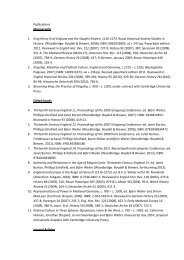
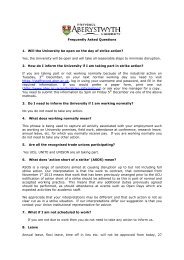

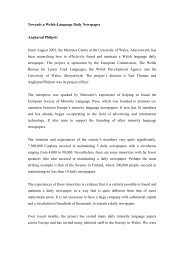
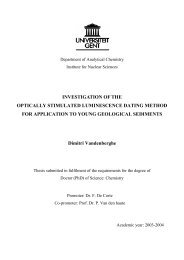
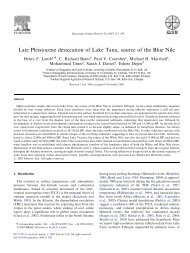
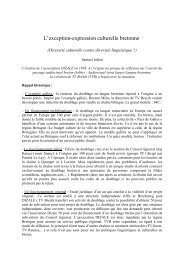
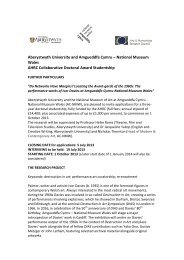
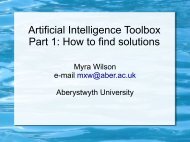
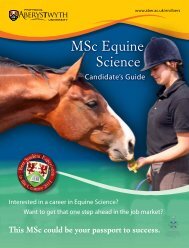

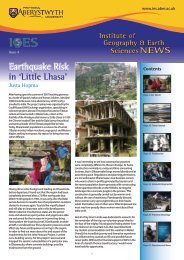
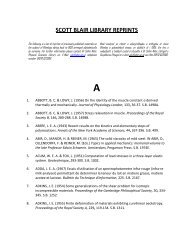
![[pdf] the council - Aberystwyth University](https://img.yumpu.com/8200062/1/184x260/pdf-the-council-aberystwyth-university.jpg?quality=85)
